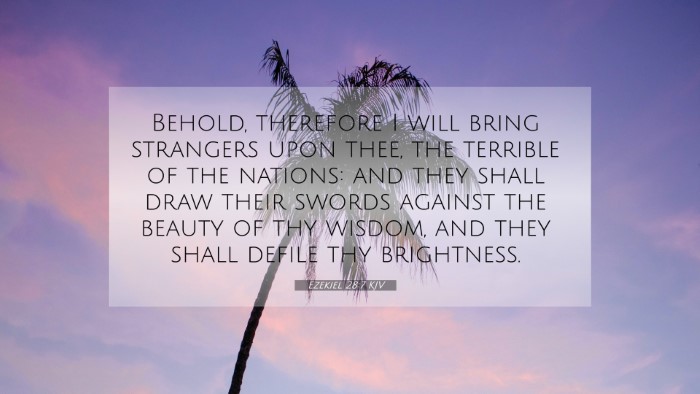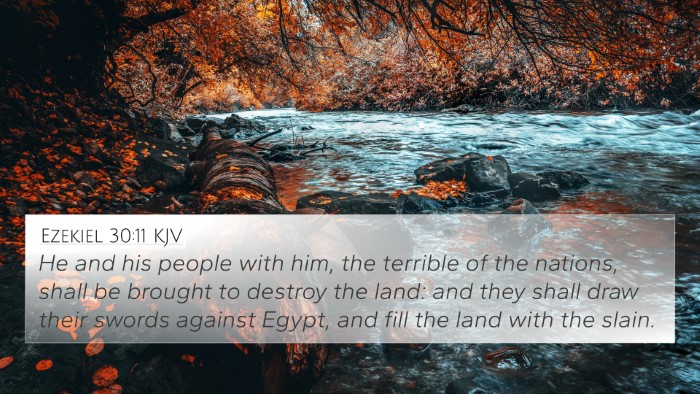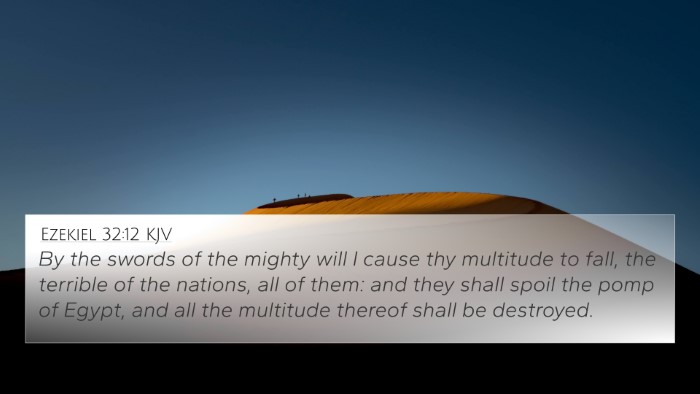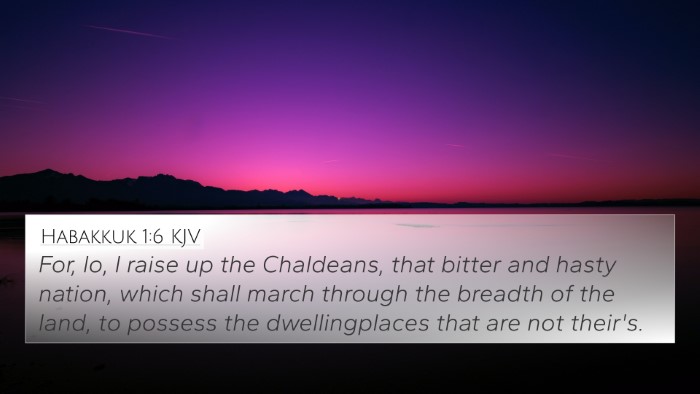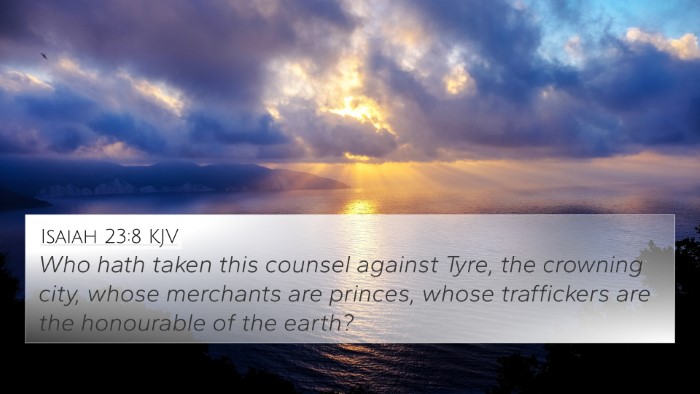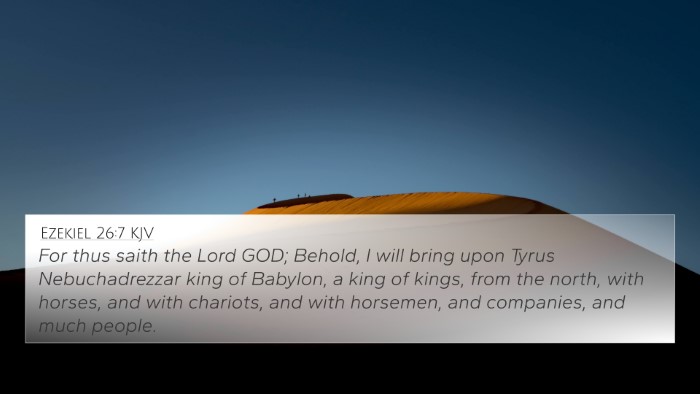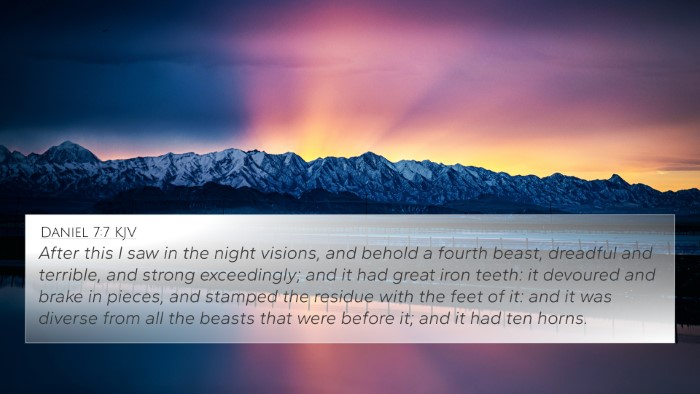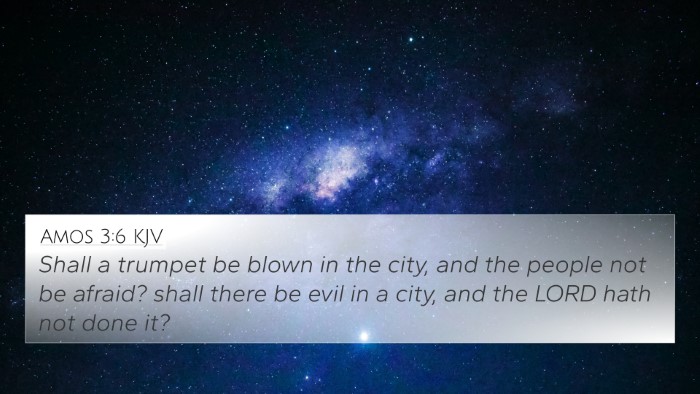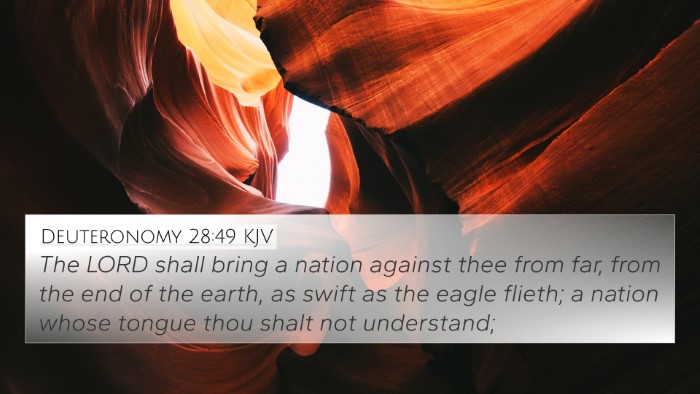Ezekiel 28:7 - Meaning and Interpretation
Ezekiel 28:7 states: "Therefore, behold, I will bring strangers upon thee, the terrible of the nations: and they shall draw their swords against the beauty of thy wisdom, and they shall defile thy brightness." This verse is part of the prophecy against the King of Tyre, symbolizing divine judgment and the downfall of unrepentant pride.
Summary of the Verse
This verse serves as a dire warning, highlighting the consequences of arrogance and self-exaltation against God. God is addressing the King of Tyre, illustrating how his wisdom and splendor will be undone by invaders, portraying the ultimate futility of human pride without humility before God.
Commentary Insights
- Matthew Henry: Henry emphasizes the gravity of pride and the illusion of security that powerful leaders often possess. He asserts that no matter how wise or beautiful one might believe themselves to be, the divine hand can easily bring low those who rely solely on their own strength and intelligence.
- Albert Barnes: Barnes notes that the "strangers" refer to foreign nations that God would raise against Tyre. He stresses that the beauty and splendor will be rendered worthless when faced with divine judgment, reinforcing the theological concept that no earthly power can withstand God's will.
- Adam Clarke: Clarke elaborates on the metaphorical language used in this passage, explaining that the "beauty of thy wisdom" signifies the pride and arrogance of those who see themselves as invincible. He highlights how the divine prophecy manifests as an eventual reality that will lead to ruin.
Cross-References for Ezekiel 28:7
- Isaiah 14:12-15: The fall of Lucifer, another prophetic illustration of pride leading to downfall.
- Jeremiah 49:7-8: Prophecy against Edom, echoing themes of judgment for pride and betrayal.
- Revelation 18:2: The fall of Babylon, paralleling the demise of Tyre as a symbol of wealth and corruption.
- Ezekiel 31:16-18: God’s judgment on Assyria as another representation of fallen pride.
- Proverbs 16:18: "Pride goes before destruction," a reminder of the inherent danger of arrogance.
- Amos 6:8: God’s disdain for high places, highlighting a theme of impending judgment for the proud.
- Matthew 23:12: A New Testament perspective on humility and exaltation.
Understanding Pride and Judgment
From Ezekiel 28:7, we glean important themes regarding the nature of pride and divine judgment. These themes resonate throughout Scripture, showcasing the connections between various verses:
- Thematic connections reveal a consistent message: pride often leads to a fall, whether in political leaders, nations, or individuals.
- This verse prompts reflection on the broader context of human arrogance, particularly in positions of power.
- Linking these scriptures helps form a cohesive understanding of God’s stance on pride across both Old and New Testaments.
Utilizing Cross-References for Deeper Study
Cross-referencing biblical texts invites deeper exploration of themes:
- Utilize tools for Bible cross-referencing, such as a Bible concordance or cross-reference guide, to enhance your study.
- Consider inter-Biblical dialogues that highlight prophetic fulfillments over time.
- Identify connections between Old and New Testament scriptures to see how themes of judgment and pride evolve.
Conclusion
Understanding Ezekiel 28:7 within the contextual framework of other scriptures enriches a believer's grasp of God’s nature and His responses to human behavior. The thematic Bible verse connections create a rich tapestry that informs our understanding of the consequences of pride. Through comprehensive Bible cross-reference materials, one can find meaningful verses that resonate with the deeper truths revealed in this powerful prophecy against Tyre. In a world grappling with power dynamics and the human inclination towards self-elevation, these scriptures serve as timeless reminders of humility and the importance of acknowledging God’s sovereignty.


